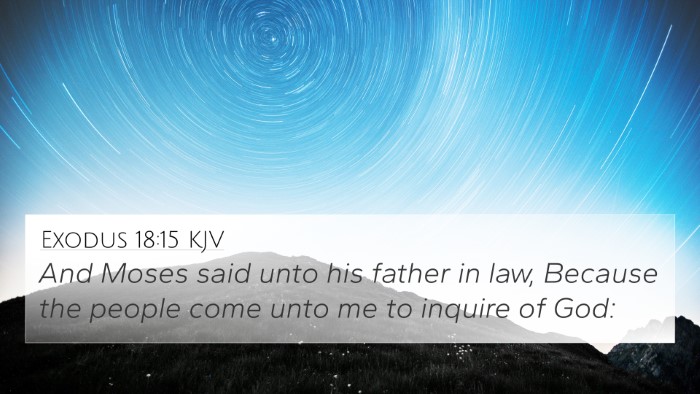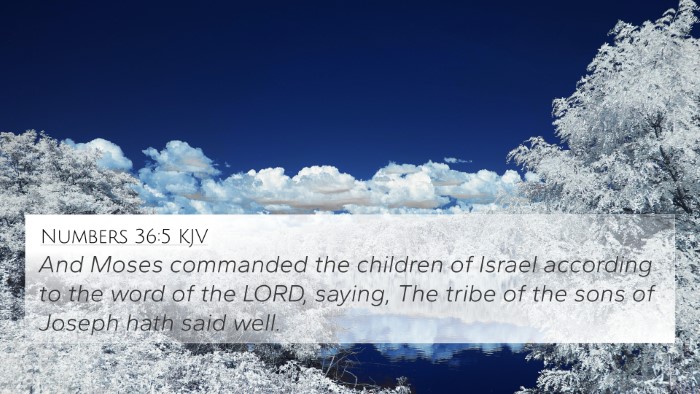Understanding Leviticus 24:12
Bible Verse: Leviticus 24:12
"And they put him in ward, that the mind of the LORD might be shewed them."
Summary of Leviticus 24:12
Leviticus 24:12 presents a significant moment in the life of Israel's community as it reflects on the consequences of actions and the importance of divine judgment. The chapter emphasizes the seriousness of the situation involving a blasphemer who had defiled the name of the LORD, showcasing the process by which such matters are handed over to God for resolution.
Insights from Public Domain Commentaries
Matthew Henry's Commentary:
- This verse shows the necessity of awaiting divine guidance. The people did not act impulsively but chose to consult the LORD.
- The process of putting the blasphemer in ward highlights the importance of understanding God's will in serious affairs.
Albert Barnes' Notes on the Bible:
- Barnes notes that the "ward" is a period of waiting, indicating the need for spiritual discernment before taking legal action.
- He highlights this process as a model for how the Israelites consistently sought God’s direction, showing their dependence on divine insight.
Adam Clarke's Commentary:
- Clarke discusses the term "mind of the LORD," which signifies the spiritual and moral implications of the blasphemer's actions.
- He also emphasizes that seeking God's judgment was critical to maintaining the holiness of the community.
Thematic Connections and Cross-References
This verse connects to several other biblical passages that underscore the themes of judgment, divine guidance, and community holiness. Below are 8 appropriate Bible verse cross-references:
- Exodus 22:28: "Thou shalt not revile the gods, nor curse the ruler of thy people." - Shows the seriousness of blasphemy.
- 1 Timothy 1:20: "Of whom is Hymenaeus and Alexander; whom I have delivered unto Satan, that they may learn not to blaspheme." - New Testament’s parallel on discernment and judgment regarding blasphemy.
- Deuteronomy 17:12-13: Discusses the importance of obedience and the consequences of disregarding God's commandments.
- Numbers 15:30-31: Explains the severity of unintentional versus intentional sinning against the Lord.
- Colossians 3:25: "But he that doeth wrong shall receive for the wrong which he hath done: and there is no respect of persons." - Reinforces the principle of divine justice.
- Psalm 74:10: "O God, how long shall the adversary reproach? shall the enemy blaspheme thy name forever?" - Illustrates the ongoing concern with God's name being dishonored.
- Matthew 12:31-32: "Wherefore I say unto you, All manner of sin and blasphemy shall be forgiven unto men: but the blasphemy against the Holy Ghost shall not be forgiven unto men." - Emphasizes the gravity of blasphemy.
- Acts 5:1-11: The story of Ananias and Sapphira, who faced divine judgment for lying to the Holy Spirit.
Comprehensive Analysis Using Cross-References
Engaging in cross-referencing Biblical texts provides a fuller understanding of Leviticus 24:12. The themes of accountability, divine scrutiny, and community integrity emerge throughout the scripture.
The act of putting the blasphemer in ward can be connected with broader principles of communal observance found in the Bible concordance and Bible reference resources. For example, parallels can be drawn with cases in the New Testament where individuals faced judgment for their actions (e.g., Acts 5).
Conclusion
Leviticus 24:12 stands as a reminder of the holy nature of God's name and the seriousness with which we are to regard blasphemy and community morals. Through various Thematic Bible verse connections, we see that God invites His people to engage in Bible cross-reference guide, urging them to seek clarity from Him before proceeding with judgment. This practice fosters an understanding of accountability and the righteousness that God demands from His people.
As we delve into scripture, let us utilize these tools for Bible cross-referencing effectively, exploring connections between Bible verses to enrich our understanding and spiritual growth.







